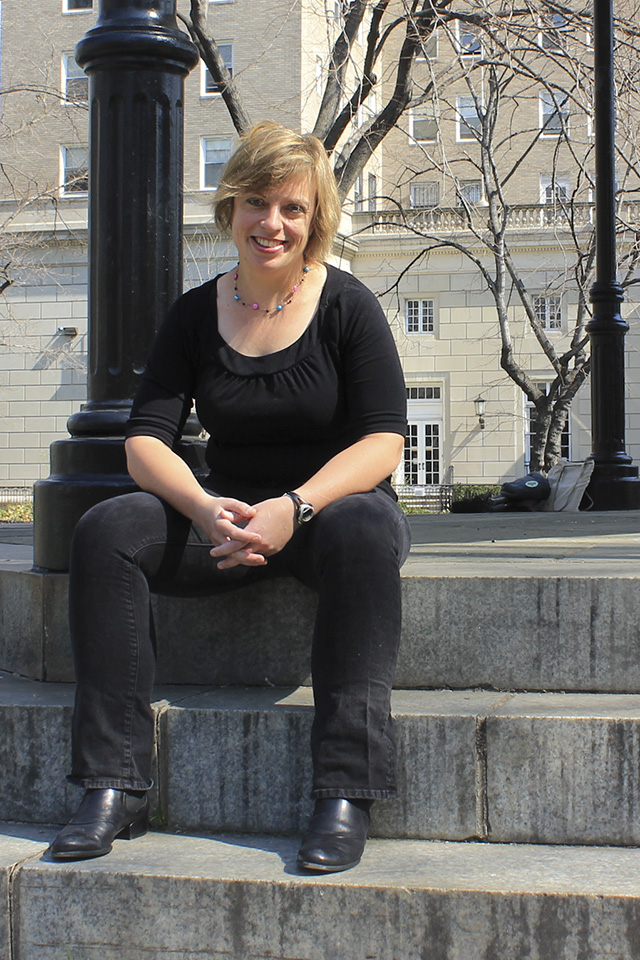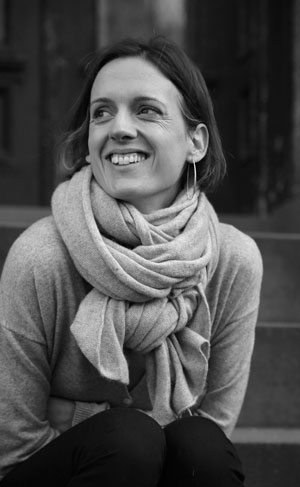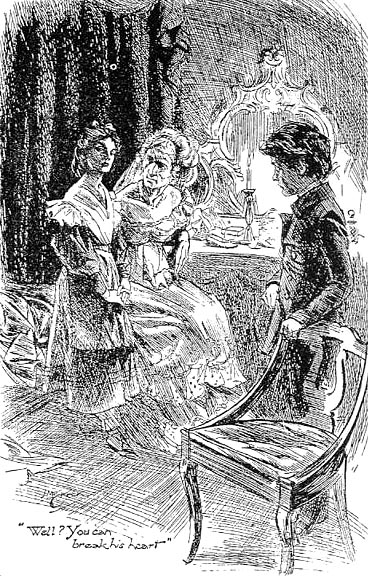
Each summer, Oxford University Press USA and Bryant Park in New York City partner for their summer reading series Word for Word Book Club. The Bryant Park Reading Room offers free copies of book club selections while supply lasts, compliments of Oxford University Press, and guest speakers lead the group in discussion. On Tuesday 22 July 2014, Jenny Davidson, Professor of English at Columbia University, leads a discussion on Jane Austen’s Mansfield Park.
 What was your inspiration for choosing this book?
What was your inspiration for choosing this book?
The book I’ll be talking about is Jane Austen’s novel Mansfield Park. It doesn’t tend to be a favorite with readers, though I’ve always loved it; I especially appreciated it when I was a graduate student, as there is something about the status of the novel’s protagonist Fanny Price as hanger-on and dependent relation that resonated with my own station in life! I write a little bit in my new book Reading Style: A Life in Sentences about how there is a perfect Austen novel for every stage of life: I loved Pride and Prejudice the most when I was young, Sense and Sensibility as a teenager, Emma in bossy adulthood, and Persuasion now that I have fully come into my own professionally as a literary critic. I am not a huge fan of Northanger Abbey, but I do love Austen’s juvenilia, the short tales like Love and Friendship and so forth. I think in many ways they show us how we might want to read the novels of Austen’s adulthood.
Did you have an “a-ha!” moment that made you want to be a writer?
I wanted to write books for as long as I can remember. (Here is the evidence: it’s my first known work, age three or so, as dictated to my mother.) I wrote compulsively throughout childhood and adolescence, but it wasn’t until my first year of college that I realized that though I really still wanted to write novels as well, my true vocation would be as a professor of literature. It still seemed an almost insurmountably long road, but from that point onward I was sure what direction I should point myself in.
Which author do you wish had been your 7th grade English teacher?
Well, many authors would have been very poor teachers – but I would have to say Anthony Burgess, whose book 99 Novels: The Best in English Since 1939 was my guide for reading throughout my teenage years. He would have been disreputable – unreliable, frequently hungover – but brilliant. Gore Vidal would have been another interesting one to have in the classroom.
What is your secret talent?
Punctuality. I have a very bad sense of direction – all places look the same to me, and I can get lost even in places I know very well – but it is easy for me to be on time and also to have a sense of how time’s passing. You would have to ask my students to know if this is really true, but I pride myself on not wasting their time in class and ending a little early whenever possible.
What word or punctuation mark do you most identify with?
The exclamation point! I do have a soft spot for the semi-colon, of course, and I can’t do without commas and periods. I am also rather partial to the em-dash and the hyphen, each of which has its own charms. I will hyphenate whenever possible.
Where do you do your best writing?
The truthful answer: anywhere with no Internet! I like to go to a cafe where there’s a bit of background buzz – easier for me to concentrate against a backdrop of minor noise than in full silence – and either write by longhand, with no distractions in the way of the internet.
Do you read your books after they’ve been published?
No, but I sometimes have to look up something or remind myself of what exactly I said in the past. My novel The Explosionist was written because I’d fallen in love with Philip Pullman’s His Dark Materials books and Garth Nix’s Sabriel books, and was haunting the bookstore wishfully hoping for something similar. When there really wasn’t anything new along those lines, I realized that I would have to write it myself.
Do you prefer writing on a computer or longhand?
I am still on longhand for a lot of draft-writing. Occasionally I have a project that seems to call out for typing rather than handwriting, but it’s less common. The couple things I always write on the computer, that come easily and enjoyably and wouldn’t feel the same in handwriting: blog posts and lectures.
What book are you currently reading? (And is it in print or on an e-Reader?)
Just finishing Alice Goffman’s wonderful On the Run, which I highly recommend. I love my Kindle Paperwhite, and read most of my pleasure reading on it these days. My apartment is also full of stacks of library books right now that I’m dipping into to make a new fall-semester syllabus.
If you weren’t a writer, what would you be?
I have toyed with the idea of taking up “kitten socializer at animal shelter” as a secondary job description. More seriously: neurologist; epidemiologist; copy editor. It would be hard for me not to be an academic of one kind or another, though I suspect I’d be in the hard sciences, computer programming or mathematics if I weren’t a humanist.
Jenny Davidson is a Professor of English at Columbia University in the City of New York. She is interested in eighteenth-century British literature and culture; cultural and intellectual history, especially history of science; and the contemporary novel. He latest book is Reading Style: A Life in Sentences. She blogs at Light reading.
For over 100 years Oxford World’s Classics has made available the broadest spectrum of literature from around the globe. Each affordable volume reflects Oxford’s commitment to scholarship, providing the most accurate text plus a wealth of other valuable features, including expert introductions by leading authorities, voluminous notes to clarify the text, up-to-date bibliographies for further study, and much more. You can follow Oxford World’s Classics on Twitter and Facebook. Read previous interviews with Word for Word Book Club guest speakers.
Subscribe to the OUPblog via email or RSS.
Subscribe to only literature articles on the OUPblog via email or RSS.
Image couresty of Jenny Davidson.
The post 10 questions for Jenny Davidson appeared first on OUPblog.


Each summer, Oxford University Press USA and Bryant Park in New York City partner for their summer reading series Word for Word Book Club. The Bryant Park Reading Room offers free copies of book club selections while supply lasts, compliments of Oxford University Press, and guest speakers lead the group in discussion. On Tuesday 8 July 2014, Rebecca Mead, author of My Life in Middlemarch, leads a discussion on George Eliot’s Middlemarch.
 What was your inspiration for choosing Middlemarch?
What was your inspiration for choosing Middlemarch?
I first read Middlemarch at seventeen, and have read it roughly every five years or so since, my emotional response to it evolving at each revisiting. In my forties, I decided to spend more time with the book and to explore the ways in which it seems to have woven itself into my life: hence my own book, My Life In Middlemarch.
Did you have an “a-ha!” moment that made you want to be a writer?
Not exactly, but getting my first story published in a national newspaper at the age of eleven in a contest for young would-be journalists—and getting paid for it—must have been a motivating factor.
Which author do you wish had been your 7th grade English teacher?
The best book I can think of that gets into the mind of a thirteen or fourteen year old is Huckleberry Finn, so please may I have Mark Twain?
What is your secret talent?
I used to be able to charm children with my ability to walk on my hands. Then I had my own child, and ever since my balance hasn’t been what it used to be. Luckily, my son doesn’t require charming.
With what word do you most identify?
“perhaps”
Rebecca Mead is a staff writer for The New Yorker. She is the author of My Life in Middlemarch and One Perfect Day: The Selling of the American Wedding. She lives in Brooklyn.
For over 100 years Oxford World’s Classics has made available the broadest spectrum of literature from around the globe. Each affordable volume reflects Oxford’s commitment to scholarship, providing the most accurate text plus a wealth of other valuable features, including expert introductions by leading authorities, voluminous notes to clarify the text, up-to-date bibliographies for further study, and much more. You can follow Oxford World’s Classics on Twitter and Facebook. Read previous interviews with Word for Word Book Club guest speakers.
Subscribe to the OUPblog via email or RSS.
Subscribe to only literature articles on the OUPblog via email or RSS.
Image credit: Rebecca Mead. Photo by Elisabeth C. Prochnik. Courtesy of Rebecca Mead.
The post Five questions for Rebecca Mead appeared first on OUPblog.


Each summer, Oxford University Press USA and Bryant Park in New York City partner for their summer reading series Word for Word Book Club. The Bryant Park Reading Room offers free copies of book club selections while supply lasts, compliments of Oxford University Press, and guest speakers lead the group in discussion. On Tuesday 24 June 2014, Maura Kelly, author of Much Ado About Loving, leads a discussion on Charles Dickens’ Great Expectations.
By Maura Kelly
Great Expectations is arguably Charles Dickens’s finest novel – it has a more cogent, concise plot and a more authentic narrator than the other contender for that title, the sprawling masterpiece Bleak House. It may also enjoy another special distinction – Best Title for Any Novel Ever. Certainly, it might have served as the name for any of Dickens’s other novels, as the critic G. K. Chesterson has noted before me. “All of his books are full of an airy and yet ardent expectation of everything … of the next event, of the next ecstasy; of the next fulfillment of any eager human fancy,” wrote Chesterson. What’s more, it might have been used for a number of the best novels written by any author – American novels in particular. Think of The Great Gatsby, Absalom, Absalom, Invisible Man, or Revolutionary Road. The same goes for Saul Bellow’s short tour de force, Seize the Day, or that of Henry James, The Beast in the Jungle. But think too of Balzac’s novel Lost Illusions, nearly a synonym for Dickens’s phrase, or another French book, Madame Bovary. Think of all the works of Jane Austen, with the various expectations that so many characters in every one of her books have about who should marry whom. And on and on.
But think too of most life stories, most personal narratives: Might they not also be called Great Expectations? For what are our lives but our attempts to realize our dreams about what we might become, and to either castigate or console ourselves if we don’t?

Miss Havisham, Pip, and Estella, in art from the Imperial Edition of Charles Dickens’s Great Expectations. Art by H. M. Brock. Public domain via Wikimedia Commons
In Pip, the hero of
Great Expectations, we have a character who is something of a combination of a Gatsby and an Austen heroine. He is fixated on attaining romantic union that will, he believes, quiet his persistent feelings of self-loathing and inadequacy; he is also all too painfully aware that he is not of the right class to attract that person. As a youth, Pip feverishly hopes that he will miraculously come into money so that he might win the heart of his Daisy – the beautiful, haughty, wealthy Estella. If Pip were a character living in America, he might have done more than dream about getting rich quick – he might have gone the Gatsby route, or the route of any number of Horatio Alger protagonists. However, living in England as he does – where for centuries, people were either born into the aristocracy or they weren’t – Pip doesn’t do much more than fantasize. Nonetheless, thanks to the magic of Dickens’s narrative, through a turn of fate that seems quite plausible in the world of the novel, into money Pip does mysteriously come. And yet, despite his newfound wealth and status, he can’t “get the girl” – the girl who is not simply the person with the power to cure Pip of his terrible sickness of the soul, but the very same girl who inflicted him with that psychological malady when she disdained Pip as a child, calling him “coarse” and “common” and generally making it clear that she thought him beneath her.
One more story that might have been called Great Expectations is that of Elliot Rodger, the young man with a BMW, a closet full not of silk shirts but Armani sweaters, and a trove of guns who killed six college students during a shooting spree in California a couple of weeks ago. Judging from the manifesto he left behind, he did not get the girls; he was scorned by beautiful women; his life had fallen woefully short of his expectations. Who can say just how that troubled young man developed his expectations, but he was what you might call a spawn by Hollywood; his parents met on a movie set, after all. And if there is any city in the world that might be called the city of Great Expectations, Los Angeles has to be it, where the world’s most visible examples of glamorous, glittering success serve as foils to some of the most desperate characters around – the red-eyed and unhinged hopefuls who have been hanging around for years or decades, hoping for the big break that never comes.
Rodger’s father seems to have had experiences on both ends of the success spectrum: Though he directed some extra shots for “The Hunger Games,” he also spent $200,000 of his own money on a documentary that sold only a “handful of tickets,” according to The New York Times. Rodger seems to have resented his father: “If only my failure of a father had made better decisions with his directing career instead wasting his money on that stupid documentary,” he wrote. And Pip, too, resents his multiple father figures – at first, at least. But unlike Rodger, Pip works through his resentment, and in doing so, finds his redemption.
When Pip’s biological father dies, he is adopted by his sister’s humble husband, the kindly if simple blacksmith Joe Gargery. Though Joe serves as the main source of comfort, happiness, and stability in Pip’s young life, when Estella infects Pip with shame, he becomes ashamed of Joe, too; thinking him too much a country bumpkin, Pip distances himself from Joe. He reacts in a similar way to the other father figure of the novel, Abel Magwitch. A good-hearted criminal, Magwitch bestows an honest fortune on the adult Pip out of gratitude for some help that a frightened young Pip had given him during an escape attempt he made years ago. Pip more or less recoils in horror when Magwitch explains that he’s the one who’s been funding Pip’s life as a gentleman. But Pip eventually pushes his through his feelings of mortification and revulsion in order to do the right thing. He repays Magwitch’s loving kindness with some loving kindness of his own, by helping the old convict attempt to evade capture after he returns to England despite threat of death, because he so much wants to see Pip.
Pip’s overcoming his lesser self in this way “is not a simple recovery from snobbery, but courage of a rare and fine kind,” according to critic A. E. Dyson. Scholar Sylvere Monod writes that the only reason Pip is able to propel himself to such courage is because he has been on a “groping quest … for the truth, not only about the world and the society among which he lives, but also, and more importantly, about himself.” That quest is what allows him to come to a greater acceptance of both himself, at the end of the novel, and his two adoptive fathers – men who, for all their lack of societal cache, have always done for Pip something that neither Estella nor Pip himself were able to: love Pip more or less unconditionally.
“Poor, miserable, fellow creature” : it is a phrase often repeated by humble Joe Gargery, and it helps to point to the lessons about empathy and acceptance that Pip must learn. While it likely would not have been possible for someone like Elliot Rodger to have derived much from Great Expectations, plenty of other readers – like this one – can continue to rely on it as a source of wisdom and comfort, as an inspiration for humility and a font of hilarity, as we grapple with our own feelings of doubt and worthlessness, with the disparity between our own great expectations and the disappointing realities of our lives. “This is the Dickens novel the mature and exigent are now likely to re-read most often and to find more and more in each time,” wrote British literary critic Q. D. Leavis in 1970, “perhaps because it seems to have more relevance outside its own age than any other of Dickens’s creative work.” That is as true now as it was when Great Expectations first appeared in serial form in 1860.
 Maura Kelly writes personal essays, profiles and op-eds. Her new book, Much Ado About Loving: What Our Favorite Novels Can Teach You About Date Expectations, Not-So-Great Gatsbys and Love in the Time of Internet Personals, is a hybrid of memoir, lit crit and advice column. She graduated from Dartmouth College and received her MFA in fiction writing from George Mason University. She started her career with jobs at The Washington Post and Slate. She has been a staff writer for Glamour, a daily dating blogger for Marie Claire and a relationships columnist for amNew York. Her writing has appeared in The New York Times, The Daily Beast, The Daily, The New York Observer, Salon, The Guardian, The Boston Globe Magazine, Rolling Stone, More and other publications and anthologies.
Maura Kelly writes personal essays, profiles and op-eds. Her new book, Much Ado About Loving: What Our Favorite Novels Can Teach You About Date Expectations, Not-So-Great Gatsbys and Love in the Time of Internet Personals, is a hybrid of memoir, lit crit and advice column. She graduated from Dartmouth College and received her MFA in fiction writing from George Mason University. She started her career with jobs at The Washington Post and Slate. She has been a staff writer for Glamour, a daily dating blogger for Marie Claire and a relationships columnist for amNew York. Her writing has appeared in The New York Times, The Daily Beast, The Daily, The New York Observer, Salon, The Guardian, The Boston Globe Magazine, Rolling Stone, More and other publications and anthologies.
For over 100 years Oxford World’s Classics has made available the broadest spectrum of literature from around the globe. Each affordable volume reflects Oxford’s commitment to scholarship, providing the most accurate text plus a wealth of other valuable features, including expert introductions by leading authorities, voluminous notes to clarify the text, up-to-date bibliographies for further study, and much more. You can follow Oxford World’s Classics on Twitter and Facebook. Read previous interviews with Word for Word Book Club guest speakers.
Subscribe to the OUPblog via email or RSS.
Subscribe to only literature articles on the OUPblog via email or RSS.
The post On Great Expectations appeared first on OUPblog.


 What was your inspiration for choosing this book?
What was your inspiration for choosing this book?


 What was your inspiration for choosing Middlemarch?
What was your inspiration for choosing Middlemarch?
